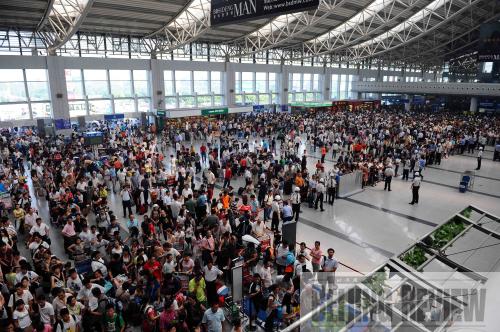|
 |
|
CROWDED AIRPORT As many as 10,000 passengers wait for their flights in the terminal of Chengdu Shuangliu International Airport in Sichuan Province on August 11, after a power failure forced the airport to shut down for three hours (CHEN KAI) |
Safe Vaccines
China's Health Ministry announced on August 12 that initial clinical tests on the country's A/H1N1 flu vaccines proved the drug to be "safe and reliable" for human use. Test volunteers readied themselves for a second round of inoculations.
No cases of severe adverse drug reactions have been reported among the more than 13,300 volunteers who took part in clinical trials of the vaccines that were developed by 10 Chinese pharmaceutical companies, the ministry said in a statement.
Demonstrating his confidence in the drugs, Health Minister Chen Zhu was the first to receive his second inoculation on August 12, 21 days after his first shot.
The Chinese Center for Disease Control and Prevention, which supervises clinical trials of vaccines in China, said the ministry would unveil China's vaccination plan after the clinical trials end in mid September.
Halting Organ Trade
Chinese authorities announced measures targeting illegal organ transplants, after reports surfaced that some hospitals were conducting organ surgeries for foreigners.
A spokesperson for the Ministry of Health said any medical institution could have its license revoked if it is unable to pass qualifying examinations, according to an August 13 China Daily article.
Currently, 164 medical institutions on the Chinese mainland are licensed to carry out organ transplants, of which 16 hospitals failed to comply with transplant regulations, the ministry said.
Organ transplants in China are covered by the 2007 regulations that ban the organ trade, trafficking and "transplant tourism" for foreigners. But some local hospitals still find selling organs to foreigners to be a lucrative business. Three hospitals were penalized for illegally selling human organs to foreigners in 2008.
Commercial Espionage
Prosecutors have approved the arrest of four employees of the Anglo-Australian mining giant Rio Tinto Ltd. on charges of trade secret infringement and bribery, according to a statement by China's Supreme People's Procuratorate on August 11.
Preliminary investigations have shown that the four employees, including one Australian citizen, obtained commercial secrets of China's steel and iron industry through improper means, which violated the country's criminal laws, the statement said.
Prosecution authorities also found evidence that proved they were involved in commercial bribery.
Investigations also revealed that suspects in China's steel and iron enterprises provided commercial secrets to them.
Preventive Evaluation
China's State Council on August 12 passed a draft regulation on environmental evaluations for new projects to better implement the 2002 Law on Appraising of Environmental Impacts.
Under the regulation, environmental evaluations would be required before the planning of development projects could be approved, according to an executive meeting of the State Council.
The regulation would cover all development activities. In the latest case of the environmental impact appraisal law, the Ministry of Environmental Protection in June suspended two hydropower station projects over the Jinshajiang River, upstream of the Yangtze River, which had started without environmental permit approvals.
Tech for Charity
Seven non-governmental organizations including the One Foundation, which international film star Jet Li started, recently received donations of IT and telecommunications products and services worth 1.3 million yuan ($190,000) from industry giants Cisco Systems China and Digital China Holdings Ltd.
The donation will help NGOs build a more efficient Internet platform for charities that impact the whole society, said Lin Zhenggang, President of Cisco China. | 